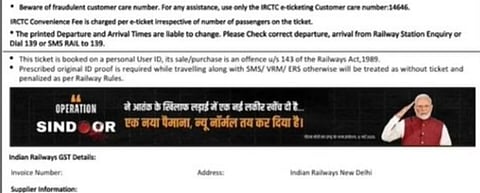
New Delhi- The Right to Information (RTI) Act, once hailed as a landmark tool for ensuring transparency in governance, continues to face erosion as authorities increasingly deny information under vague pretexts. In the latest such instance, an RTI activist’s query regarding the cost of printing Prime Minister Narendra Modi’s images along with mentions of ‘Operation Sindoor’ on railway tickets was rejected, with the government citing “national security” as the reason.
Activist Ajay Basudev Bose had filed an RTI application with the Indian Railway Catering & Tourism Corporation (IRCTC) on June 3, 2025, seeking:
The total amount paid by the Government of India to print images of PM Modi and references to Operation Sindoor on reservation tickets.
The name of the advertising agency hired for this purpose.
On July 3, 2025, the IRCTC disposed of the request, stating:
“The information sought is confidential in nature and as per Section 8(1)(a) of the RTI Act, cannot be provided as national security aspects are involved.”
Bose expressed shock at the response, asking, "To know about the cost of Printing on Reservation Tickets about #OperationSindoor what National Security aspect is involved ? Modi gives Sermons on Transperancy in Governance but his Govt does not practice what He preaches."
This incident adds to growing concerns over the weakening of the RTI Act. Over the past few years, several RTI queries related to government spending, electoral bonds, and even routine administrative decisions have been denied under Section 8(1)(a) (sovereignty, security concerns) or Section 7(9) (disproportionate diversion of resources).
Experts say the excuse is being misused to avoid accountability. Critics argue that the "national security" excuse is increasingly being misused to avoid accountability, especially when questions pertain to government propaganda or politically sensitive expenditures.
You can also join our WhatsApp group to get premium and selected news of The Mooknayak on WhatsApp. Click here to join the WhatsApp group.